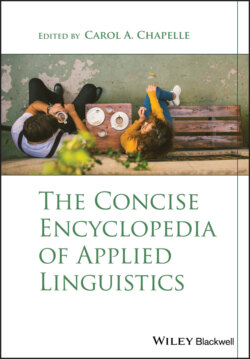Читать книгу The Concise Encyclopedia of Applied Linguistics - Carol A. Chapelle - Страница 157
Recall
ОглавлениеThe second level of vocabulary knowledge involves the ability to recall the target word from memory when prompted to do so. This is the converse of recognition and it is acknowledged to be a more challenging task, requiring a stronger form–meaning link in the learner's mind. Another way in which a recall item demands more of test takers is that, whereas recognition assessment typically requires them to select a response from those provided, with recall the test takers must supply the target word. Thus, one kind of recall task is simply to present the learners with a set of meanings, perhaps in the form of words or phrases in their own language, and require them to provide the L2 equivalent of each one. Labeling of objects in a picture or processes represented in a diagram are other ways in which the learners' ability to recall vocabulary items can be assessed.
Perhaps the most commonly used form of recall assessment is the gap‐filling task. In its simplest form, the items consist of sentences from which one content word has been deleted, like this:
I went to borrow a book from the ________.
The task is to write in the missing word. It should be noted that this type of item is more difficult to score than a selected‐response item. First, there are often several possible words that can fill the blank, some of which may be more acceptable than others. In this case, library is the intended answer, but librarian, teacher, and shelf also fit the gap. Second, having to supply the word means that test takers may misspell it or provide the incorrect grammatical form. This raises the question as to whether the focus of a recall item is simply on meaning, so that a word form which fits semantically is acceptable even if it is in the wrong form, or whether the gap‐filling task provides the opportunity to assess various other aspects of word knowledge as well. These include not only spelling and grammar but also, for more advanced learners, aspects such as collocation and idiom, as in these examples:
To stay awake, they drank several cups of ______ coffee. [strong]
Several people claimed to have seen the missing girl, but these were all red _______. [herrings]
Recall tasks can be based on paragraphs or longer texts, with multiple deletions, rather than just separate, unrelated sentences with a single gap. Such tasks are often referred to loosely as cloze tests. However, it is important to note that in the standard cloze procedure words are deleted at fixed intervals (e.g., every seventh word) so that all types of word can be omitted, including articles, prepositions, conjunctions, and other function words. A standard cloze obviously draws on vocabulary knowledge but, if a text‐based gap‐filling task is to assess directly the ability to recall lexical items, it should be nouns, verbs, adjectives, and adverbs that are selectively deleted.
